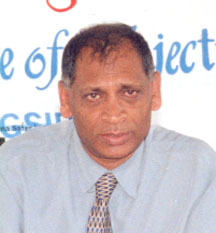Health Minister Dr Leslie Ramsammy said on Monday that he was unaware of any regional agency requesting HIV testing as a pre-requisite for employment, adding that if this was occurring at a Caricom agency he was “not informed”.

UWI lecturer, Dr Arif Bulkan, said the Caricom Implementation Agency for Crime and Security (Caricom Impacs) had subjected a prospective employee to HIV testing as a precondition for employment back in 2008 and to date, he said no official at the regional body or its unit, the Pan Caribbean Partnership against HIV/AIDS [PANCAP] has responded to questions about it.
Bulkan detailed the issue of the employee in an article published in Monday’s edition of this newspaper titled, ‘The Hypocrisy of Caricom’. He said the employee, without any prior counselling, was informed that he was required to take an HIV test while completing a medical examination; the medical was requested by the agency.
According to Bulkan, the Executive Director of Caricom Impacs later informed that the employee had two choices: either take the test or withdraw his application. Bulkan said he wrote to Caricom in addition to its PANCAP unit seeking answers; he received mere acknowledgments of his letters from and in one instance, was ignored.
Stabroek News sought a comment from PANCAP, but was informed that its Executive Director was away on business and as a result, no comment would be forthcoming at this time. Efforts to obtain a comment from other Caricom officials also proved futile.
Ramsammy, speaking on the issue, labelled it “wrong” and said no agency in the region or anywhere should subject employees to HIV screening as a prerequisite for employment. He said this was not in keeping with the national policy on HIV and also against anything the Ministers of Health in the region has advocated for over the years.
“I don’t support such a practice, but I cannot dictate to any agency what policies to implement,” Ramsammy said. He said advocates against this practice can lobby for it to be changed, adding that there is little else they can do. Ramsammy said there are some jobs where a person’s HIV status would be considered, but the practice is unacceptable.
Ramsammy said he is unsure which Council of Ministers, as referred to in Bulkan’s article, would have supported HIV screening for employment. “It certainly was not a Council of Health Ministers, and I can say here as a Minister of Health in the region; such a practice is wrong and I cannot support it,” he added.
Bulkan referred to the practice as a deeply inhumane policy which excludes a whole category of persons from the means of earning a living at precisely the time when they are or may be at their most vulnerable. “This has practical implications for the wider society, as productive people are potentially forced into poverty and become a burden on family, friends and the state,” he wrote, noting that it is also ineffective in that it cannot achieve the purpose of a HIV-free workforce.
He continued that what is most incomprehensible about the policy of mandatory HIV employment screening is that it expressly contradicts the practice and policy of Caricom itself, adding that an entire unit of Caricom – PANCAP – has been set up and is devoted to the fight against this disease. He also pointed to donor funding which related Caricom projects receive, noting that all expressly prohibit HIV screening as a pre-condition for employment.
“On its website PANCAP speaks to the perils of HIV-related stigma and discrimination, which is based on ignorance and fear about HIV and AIDS and is fuelled by irrational policies such as mandatory testing,” Bulkan added.
